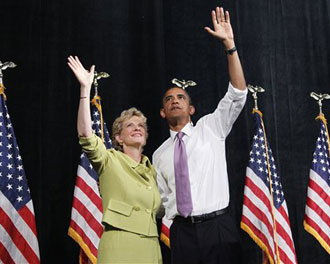When you are young you tend to see a world of possibilities and little of its realities. You tend to believe that those favored by fortune have an innate compulsion to do good as well as to do well. Consequently, for most of my adulthood I voted Republican, putting faith in Ronald Reagan’s supply-side economics. My faith in this basic tenet of conservative economic theory was strong enough to overcome my growing dismay at the GOP’s compulsion to dictate the most private decisions that human beings can make.
In the late 1990s, even as I came to appreciate the light touch with which Bill Clinton, a Democrat, helped America do good as well as do well, I remained a Republican at heart. I saw nothing to discredit the innate logic of a society that puts rewarding success and hard work ahead of promoting fairness and human dignity. After all, somebody has to create it so everyone can share it.
It wasn’t until 2004 that I began to see how that principle had become distorted into the unsettling premise that any kind of profit, no matter how ill-gotten, enjoyed more protection than the most basic rights, no matter how badly abused. If your company could squeeze billions by exploiting the ignorance or desperation of the needy, you were not only entitled to every buck, you were entitled to ironclad legal protection from those seeking redress against the suffering you caused! As house prices soared in defiance of every economic principle, the GOP gloated at the marvel of their gravity-defying profit machine.
Anyone with math skills could see that the most basic laws of supply and demand would soon reassert themselves with a thundering crash. And of course, they have, as the whole world knows by now.
Bill Clinton had it right: supply-side economics, at least as interpreted by the GOP, was, indeed, upside-down economics. It posited that a legally sanctioned ponzi scheme could be run endlessly even as the economy ran out of victims to sucker into an overinflated property bubble. It took Obama and the Democrats to persuade Americans that you need secure consumers to consume what supply-siders wanted to sell for profit.
Now the GOP is trying to induce a case of mass amnesia in American voters. Barack Obama and the Democrats created our current high unemployment rate and our hefty national deficit, they seem to say. Forget that Obama took office in January of 2009 and not January of 2001. Forget that Obama used the power of his oratory to persuade Americans not to panic but to keep faith in our ability to right the upside-down policies that put us on the brink and slowly restore order and equity and even prosperity.
Barack Obama has backed us away from the brink. Notwithstanding the incessant media chatter that sees a double-dip at every downtick of every data point, the jobless rate is on the decline and growth has returned. More slowly than everyone would like, to be sure, but we are unmistakeably far from the brink. Even the doom-and-gloom IMF has upped the global growth forecast for the second time to a downright blazing 4.6%. The hard-won health-care reform and pending financial reforms will help boost consumer confidence and keep us far from the brink.
Of course the GOP is now working hard at inducing election-year hysteria about our budget deficit. On this issue too it’s important not to develop mass amnesia. By 1999, the seventh year of Bill Clinton’s presidency, the federal government recorded a budget surplus of $123 bil. The next year it nearly doubled to $223 bil. It was the biggest surplus ever recorded, in stark contrast to the $290 bil. deficit Clinton inherited when he took office.
In 2001, as Clinton’s two terms were ending, the Congressional Budget Office forecast average annual surpluses of $850 billion for 2009 through 2012. Today the average deficit forecast for those years is $1.215 trillion. To ascribe that to Obama’s policies would require a thorough case of amnesia. In fact, a New York Times analysis ascribed only 10% of that swing to policies actually enacted by Obama after taking office. The rest was ascribed to the recession and policies enacted by the Bush Administration.
So the choice is clear, it seems to me. As Obama has said, we can go back or we can move forward to another era of rightside-up economics.

